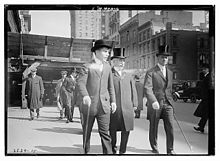Charles W. Morse
| Charles W. Morse | |
|---|---|
 |
|
| Born |
October 21, 1856 Bath, Maine |
| Died | January 12, 1933 (aged 76) Bath, Maine |
| Residence | New York City |
| Nationality | American |
| Alma mater | Bowdoin College |
| Occupation | Banker, businessperson |
| Criminal charge | Fraud, war profiteering |
Charles Wyman Morse (October 21, 1856 – January 12, 1933) was an American businessman and speculator, guilty of major frauds. At one time he controlled 13 banks. Known as the "Ice King" early in his career out of New York City, through Tammany Hall corruption he established a near-monopoly of the ice business in New York, before buying several shipping companies and moving into high finance. His attempt to manipulate the price of copper-shares set off a wave of selling that developed into the Panic of 1907. Jailed for violating federal banking laws, he faked serious illness and was released. Later he was indicted for war profiteering and fraud.
Morse was born in Bath, Maine, in 1856, the son of Benjamin Wyman and Anna Eliza Jane (Rodbird) Morse. His father had a large role in the towing business on the Kennebec River. Charles was already involved in the shipping business while a student at Bowdoin College, and at his graduation in 1877 he had accumulated a sizable capital. After college he went into business with his father and a cousin, Harry F. Morse, forming C.W. Morse & Company and engaging in an extensive business shipping ice and lumber.
As his business interests grew, Morse moved to Boston and, in 1897, New York City.
He organized the Consolidated Ice Company in 1897 and went into the ice business. In 1899 he merged it with several other companies to form the American Ice Company which, grossly overcapitalized at $60 million, held a virtual monopoly for ice in New York. Morse quickly became known as "The Ice King". At that time commercial ice was cut from frozen rivers, much of it in Morse's native state of Maine.
On May 1, 1900, Morse attempted to use his monopoly to raise the price of ice. The plan backfired, however, and it was revealed by the New York Journal and Advertiser that Morse had obtained special privileges from Tammany Hall to run his business, and in exchange Robert Van Wyck (New York City's first mayor over the five united boroughs) had been given a substantial ownership share in the ice companies (by then known as the "Ice Trust") as had Richard Croker, the boss of Tammany Hall. Having formed a holding company called the Ice Securities Company, Morse manipulated its stock and left the ice business with a profit of some $12 million.
...
Wikipedia
